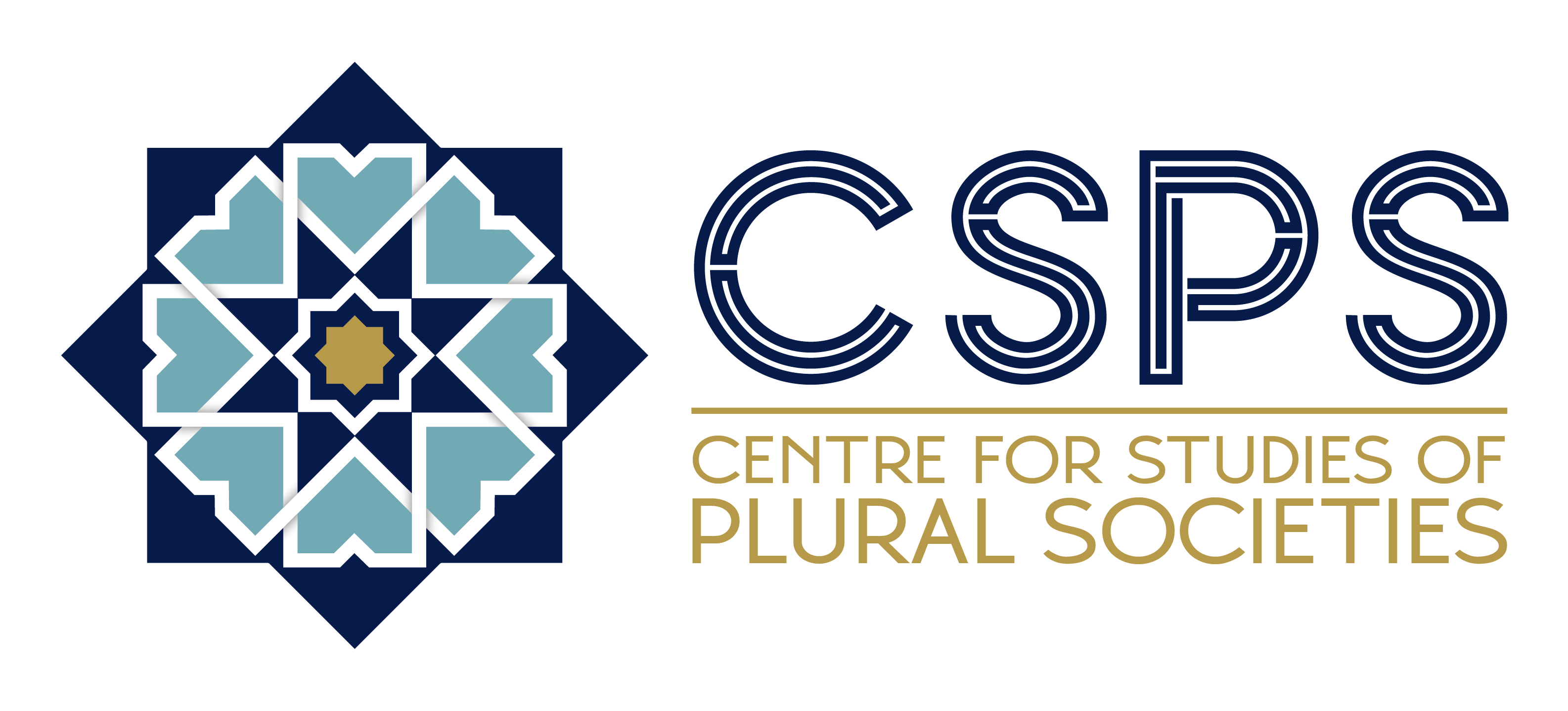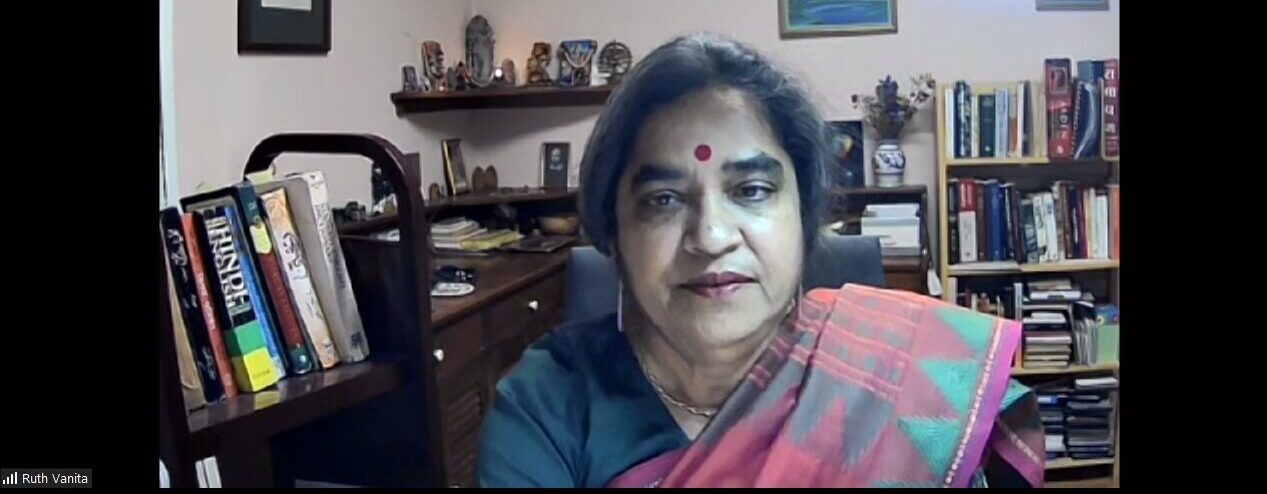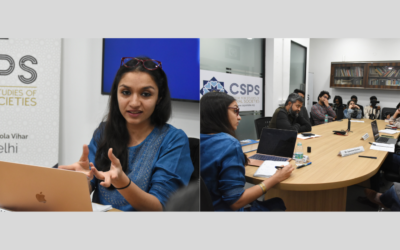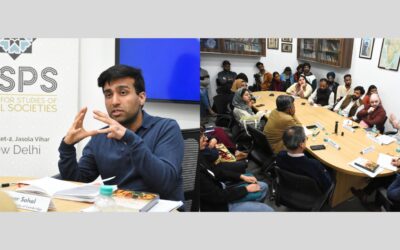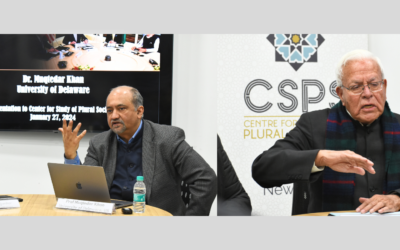Report by Mohammad Shahrukh, Research Intern at CSPS
The CSPS Internship comprises a series of virtual talks and lectures featuring prominent thinkers, scholars and writers, to speak on pressing themes related to the field of pluralism. The third session hosted Professor Ruth Vanita, who gave a talk to our interns about the “Philosophical Understanding of Gender and Personhood in the Mahabharata ”. The session included an introductory lecture following an interactive question and answer session between Prof. Vanita and the interns at CSPS.
About the speaker
Professor Ruth Vanita is a globally renowned author, specializing in British and Indian literary history. She completed her B.A, M.A and PhD in English from the Delhi University, where she also taught for two decades. In 1978, she co-founded ‘Manushi: A Journal About Women and Society’ which became India’s first nationwide feminist magazine that combined academic inquiry with grassroots level activism in feminism.
Her literary career spans over a dozen books, translations and edited works. Some of her prominent works are “Memory of Light (a novel, Penguin 2020); Love’s Rite: Same-Sex Marriages in Modern India (2005)”, “Gender, Sex and the City: Urdu Rekhti Poetry in India 1780-1870 (2012) and “Dancing with the Nation: Courtesans in Bombay Cinema” (2017). She has also translated many historical literary pieces originally in Hindi and Urdu to English, most notably, “Chocolate: Stories on Male-Male Desire” (2008).
She continues her research in the field of literature, focusing on gender and sexuality while working on her literary endeavours. She is a Professor of ‘English and World Cultures’ at the University of Montana, Missoula, USA where she is also the director for the program in South and South East Asian Studies.
About the session
Professor Ruth Vanita’s lecture was based on one chapter in her forthcoming work “The Dharma of Justice in the Sanskrit Epics: Debates on Gender, Varna and Species” to be published by Oxford University Press at the end of this year. She pointed out that the epics criticize the practice of discrimination in two ways; philosophically and practically. Philosophically, the epics contain conversations between characters with varying opinions. Practically, the Epics depict the actions of characters which show how they practice non-discrimination.
“The Epics show that Dharma is more than laws,
and that laws that contradict reality, are incorrect.”
-Professor Ruth Vanita
Prof. Vanita described how the Epics often depict characters of supposedly low status as upholders of ‘Dharma’. These characters often act in ways that the conventions of the period prohibited.
Thinkers, writers and scholars throughout history (such as bhakta poets, nationalists, and gurus) have used these intellectual tools that the Epics provide, in order to dismantle social discrimination. However, most modern scholars choose to exclude the aspect of self-criticism from their translations/analyses of the Epics. Prof. Vanita quotes the exception of Jayantri Ghosh:
“In pursuing its central moral enquiry into the nature
of ‘Dharma’, or righteousness, the Mahabharata
holds up alternatives to social norms to the point of
subverting Hindu convention.”
Professor Ruth Vanita explained the concept of ‘Samatva’ (sameness) in the epics. This depiction is based on a fundamental Upanishadic understanding of reality. All bodies are made up of the same matter, and second, all consciousnesses are one, or else are linked to one another. She helped the virtual audience trace these findings through literary evidence from the ‘Mahabharata’ and examples from the work of ‘Bhakta’ poets such as Kabir, who repeat the same ideas that are expressed in ancient texts.
Prof. Vanita then addressed debates on gender in the epics, particularly how they draw from the ‘Upanishads’ understanding of the ideas of ‘sameness’ and the ‘self’. Paraphrasing from one of the ‘Upanishads’ she explained how the ‘Atman’ (self) is one, but also becomes many. She went on to define the ‘non-gendered’ nature of the ‘Atman’, as stated in the ‘Svetasvatara Upanishad:
“It is not female, nor is it male, nor is it neutered-
It is joined, with whatever body it takes.”
Most philosophers and thinkers of the Sanskrit epics are in agreement that gender and sex are transitory, and not intrinsic to oneself. Prof. Vanita explained the importance of contextual language, in her examination of the Sanskrit word ‘Purusha’ (consciousness). The word is commonly used to refer to a male person today, but has many meanings in Sankrit. As consciousness, Purusha has no gender. Similarly, the words ‘Prakriti’ (nature) and ‘Maya’ (illusion) are grammatically gendered female but the concept of Prakriti has no gender. All living beings of any gender are made up of Purusha and Prakriti.
She gave the example of one line from the ‘Manusmriti’, that says women must always be protected by men. However, Prof. Vanita described such a reading of ancient texts as limited, since most people do not realize that many characters in the epic disagree with this view and give philosophical reasons for their disagreement. Some women teachers in the epics live in ways that contradict this dictum.
Professor Vanita conducted a close reading of passages from the epics to expand upon the epics’ self-critique on matters of understanding the self’s orientation and classification.
She expanded on her earlier work regarding the dialogue between female sage Sulabha and male king Janaka, by placing it in its epic context. The dialogue is preceded by other dialogues, one of which is between another Janaka king and Sage Vashishta, wherein the king asked the sage of the difference between the ‘Kshara’ (destructible) and ‘Akshara’ (indestructible). The sage tells the king that consciousness has no gender. In her book “Love’s Rite: Same-Sex Marriages in Modern India” (2005; updated edition 2021), she reported that several Hindu priests who perform same-sex marriages as well as lay Hindus argued that marriage is a union of spirits and the spirit does not have a gender.
Prof. Vanita’s next analysis a dialogue between the Janaka King Janadeva and Sage Panchashikha. The King asks the sage how to avoid old age and subsequent death. Sage Panchashikha responds by saying that the flow of time cannot be stopped, he refers to our lives as a river, which is unstoppable. Along the way we form temporary relationships that may recur in different births but are still brief. The sage asks the king why one should rejoice at birth and mourn at death
“Where have I come from?
Who am I?
Where will I go?
To whom do I belong?
Where am I established?
Where will I be?”
The final debate that the Professor briefly summarized was between sage Sulabha and a Janaka king. Sulabha’s philosophical response to the king’s questions about who she is and to whom she belongs, was that the body is an assembly of particles and that just as dust and water are indistinguishable, so are the atoms and our body. Prof. Vanita noted Sulabha’s conclusion that the body keeps changing constantly. These changes are invisible and minute.
The professor also remarked on how Sulabha’s understanding of consciousness and the human body is different from Descartes’ philosophy of “I think, therefore I am”. In Hindu philosophy (stated also in the Gita and many other texts), the mind is one of eleven bodily faculties, and there is a clear distinction between the mind and the consciousness. It espouses the belief that animals may not think as humans do, but nevertheless possess consciousness. Descartes, on the other hand, argues that because animals do not think, they have no souls or consciousness and care just machines that we can use as we like.
Professor Ruth then introduced the virtual audience to the changing meaning of the word ‘Vyakti’. Commonly used as a translation for the English word ‘person’, ‘Vyakti’, in Sanskrit actually means ‘expression’:
“The difference between these words constitutes
in my view a major difference between two cultural understandings
of personhood or individuality.”
-Professor Ruth Vanita
Prof. Vanita described how sage Sulabha’s explains gender and sex by referring to a foetus. The sage highlights how the fetus is born from blood and semen and is only given a ‘Linga’ (gender) and ‘Namarupa’ (name and identity) after its genitals become visible. Professor Vanita went on to conclude, from the text, that the transition from genderlessness to gender is like the transition between youth and age, that is, it is temporary and not intrinsic to the self.
King Janaka next says that brahmans derive their power from knowledge but women derive their power from youth, beauty and good fortune. Janaka disrespects Sulabha by asking her questions about who she is, and where she comes from, questions that must not be asked of a renunciant. Sulabha treats these as philosophical questions and challenges the king’s ideas of men’s power. She says that even a man who rules the world can live in only one city at any one time, and can only have one palace and one bed. Sulabha argues that a king is actually dependent on others ‘paratantra’. She also says that all men are kings of their households but like rulers, they experience fear and insecurity, and though they think they are independent, they are not. Sulabha then asks about the Self or Atman:
“Who then has come from where
or where not?
Whose is it, or whose is it not?
Where is it, or where is it not?”
These questions are meant to make one one understand that nothing or no one truly belongs to anyone but everything belongs to every being (including animals).
Following this enriching and erudite opening lecture by Professor Ruth Vanita, the floor was opened to the interns and attendees of the talk, for a Q&A session.
Q&A session
The first question connected the lecture to contemporary society. An intern from CSPS asked if the backward understanding of the roles of a man and woman in Hindu households today is a result of the over-simplification or rewriting of Hindu textual knowledge. Prof. Vanita responded that there is no one understanding of gender roles in Hindu households. There is a wide range of understandings. Second, very few people read the texts.
Another CSPS intern inquired how one should deal with texts of the epics today, given how philosophical discourses that have cropped up in between the temporal gap between their production and now can affect our perception of them. In responding to a particular inquiry of “should the text be read within its time?” Professor Ruth said “yes and no”. Yes, because it helps us understand the original text in its historical context; however, the basic philosophical ideas of the epics are found in Hindu texts both before and after the epic period.
This was followed by a comment that made a connection between Prof. Vanita’s mention of a universal oneness to the followers of the ISKCON movement. While chanting ‘Hari Krishna’ in unison it is said that people break the binary of the oneness, mind, body and gender, and become a spiritual collective.
This was followed by a very eye-opening conversation by Professor Omair Anas, Director, Centre for Studies of Plural Societies and Professor Ruth Vanita. Prof. Anas drew from Prof. Vanita’s comments on how ‘Prakriti’ has no gender and how we are also genderless until we are born and questioned if most of our struggles, be it for identity, gender or against patriarchy; are essentially struggles against classifications that humans themselves have constructed.
Prof. Vanita commented that the human mind and human language work by forming categories. It is not possible to get rid of all categories. The process of creating new categories and labels for people as well as contesting them will be endless.
Finally, Prof. Anas expressed how the binary of man and woman is insufficient in capturing the diversity of identity. He gave the example of how every different kind of moon has a different name in the Arabic language, ‘Badr’ (full moon) and ‘Hilaal’ (new moon). Prof. Vanita remarked that “language is an inadequate attempt to capture things around us” hence the large number of synonyms in many classical languages, including Sanskrit, Persian, Latin etc.
With this the discussion ended. The vote of thanks was offered by Saad Ahmed, research assistant at CSPS.
